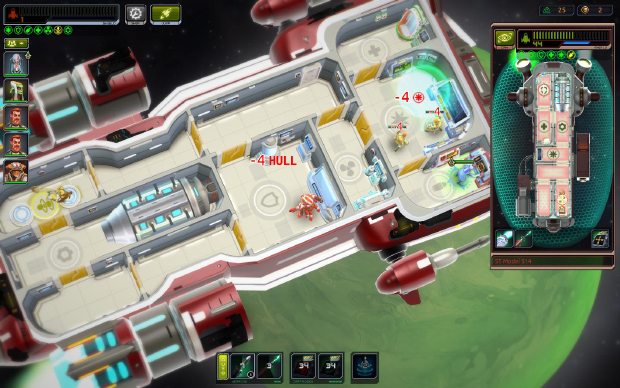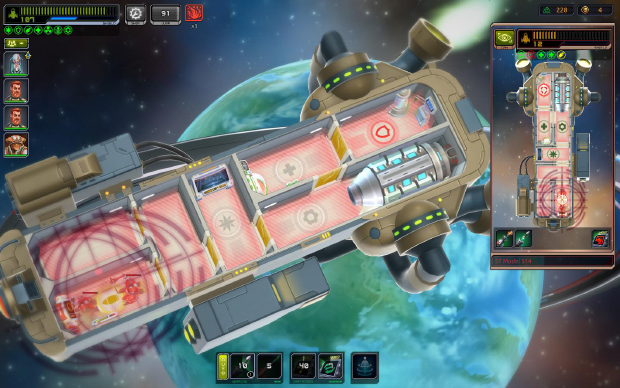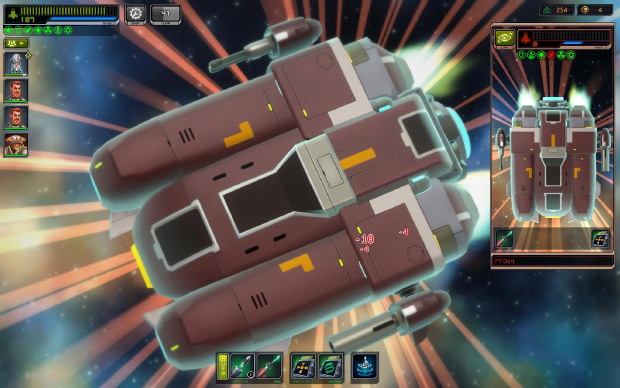Premature Evaluation: Space Rogue
Stars in its eyes
Each week Marsh Davies beams aboard the hostile vessel of Early Access and comes back with any stories he can find or otherwise lasers the life support system and surrenders himself to the cold grip of the vacuum. This week, he succumbs to randomised interplanetary peril in Space Rogue, a rogue-like game set in space and strong contender for RPS’s Most Literal Title Award 2015.
Space Rogue is a lot like FTL. Let’s get that out the way. Your ship travels from planet to planet, encountering and resolving brief randomised events. Many of these involve ship-to-ship combat, during which you micromanage your crew - fixing hull breaches, putting out fires, fighting off boarding parties - while ensuring your arsenal is trained upon your opponent’s most vulnerable systems. Here are the two main ways in which it isn’t like FTL: 1) you are free to explore without a fleet of ships chasing you onward and 2) it has 3D graphics.
Let’s not skip over that second point with too much haste - its 3D graphics are very nice indeed, with a vision of interstellar adventure informed by 1950s pulp, and rendered with a velvety rim-lit lustre. It gives everything a voluptuous solidity, from the Matador Red undulations of your spacecraft’s body - which faintly resembles a ‘57 Chevy Bel Air - to your captain’s cartoonish pill-shaped bonce. Alien species and hostile ships are given just as much attention - all rounded edges and ray guns - and the entire thing gives off such a strong whiff of Golden Age Americana that just looking at a screenshot makes me want to order fries and a milkshake.
The available menu proves a little less predictable and a good deal more lethal than that, however - and is soundtracked by synthy lounge music rather than Little Richard. Rebellious robots threaten to abduct crew members, pirates try to turn you into scrap and overzealous security forces persecute you as a dangerous criminal (only sometimes mistakenly). Even without hostile intervention, calamity is foisted upon you at every turn: your ship may spontaneously catch fire, be punctured by a wayward drone or be scorched by deadly radiation. Mining operations can explode in your face. Crew may mutiny at their working conditions. It’s a game about rolling with the punches, and then swiftly crumbling beneath the punches and dying.
After the novelty of several messy space deaths has worn off - and players of FTL may find it already has - I’m not sure how satisfying mere fatalism is. On some runs an entire twenty-minute-long death spiral may work itself out without the player having made any real decisions: instead you end up clicking OK on a large number of depressing dialogue boxes and then starting again. Partly this is a matter of rebalancing the probabilities during its stay in Early Access, and Space Rogue already includes a custom game option which allows you to control the odds of nearly every variable. But it’s also because, currently, the game doesn’t allow within its random encounters many chances for the player to overcome them through skill. On some unluckier playthroughs it can feel like reading a Choose Your Own Adventure in which every entry states, “Everything’s shit and you’re going to die soon.” And who plays games to be exposed to the truth?
Combat is the main means by which you can massage the odds through your ability, juggling control of your crew, your weapon systems and special abilities to best effect. Some weapons, like rockets, punch straight through enemy shields, while lasers have the advantage of a much quicker cooldown. Special abilities might empower shots, instantly patch up hull breaches, or somehow let you start fires on your opponent's ship. So far, so FTL, but here there is no need to shunt power from one system to another, and only the captain is able to improve a system's efficacy by jumping on the console. Nonetheless, figuring out which functions of the enemy vessel to target and in which order requires a little thinking and careful timing, but even then, there is usually an apparent optimum strategy which you can apply with relative ease by pausing the game at any moment to queue up commands. It’s also usually clear from the outset whether that optimum strategy will be enough or whether you are simply doomed.
And, in every game I’ve played, at some point, I’ve been simply doomed. I’d prefer it if nearly every encounter was surmountable, not by chance, but by skill. Randomisation is a handy way to generate stories that are unique to each playthrough, but when the player’s participation is merely a die roll, it saps the meaning of those events, and how much the player is invested in the decisions she or he makes. Being unlucky in such a universe feels like a waste of time - a mission in which each random event unavoidably blows off a chunk of your hull and withholds any means to repair your vessel doesn’t interrogate or engage the player’s abilities at all. It’s just a simulation of entropy.
It would be a shame were it to stay like this, because, assuming you live long enough, playthroughs do begin to generate more interesting and particular scenarios. The ability to upgrade your ship, to swap out weapons and special modules, to hire and level up crew - these things end up giving your mission a distinct complexion. Combat is enlivened with new strategies as the abilities of your ship and your opponent’s become increasingly asymmetric. I would hope the developers are looking to exaggerate this further; certainly more playable vessels are planned, each with their own strengths and weaknesses.
I’m also intrigued by the overall motive for your expedition, the later stages of which I have yet to survive to see. Instead of fleeing an oppressive regime, as in FTL, the circumstances of your journey vary in Space Rogue. Sometimes a robot insurrection threatens all biological life, sometimes human eugenicists must be stopped from starting a pan-galactic war, sometimes you must prevent a renegade faction from rending open an interdimensional portal - the solution to each requires you to follow a trail of information, ultimately locating an enemy’s base of operations, say, or hunting down and destroying an artifact. This plays well into the game’s less linear, more exploratory structure, encouraging you to scour each planet, hoping that the random event generator will spit out a clue for where to go next. I could see ways in which some small amount of detective work might be encouraged here, too, giving additional strategy to your wandering.
Without doubt, Space Rogue is a robust, playable and enjoyable game - in spite of my whining about the role that (usually bad) luck plays within it. I can only assume its balance will improve, its dynamism increase and its avenues for player expression multiply. But it’s already playing catch-up with FTL, a game that currently equals or surpasses Space Rogue’s complexity in most of its systems, and whose sheer quantity of content has been enriched further by an Enhanced Edition which costs half of what this new game is asking for its Early Access build. Space Rogue may well go on to differentiate itself - I’m curious about its stated plans for mod support and what it intends to do with the persistent player stats, which level up across attempted sorties. But as gorgeous as I find the game’s pulp sci-fi futurism, it’ll have to do just a little more to convince me that this is a vision of the future worth waiting for.
Space Rogue is available from Steam for £23, although it’s discounted to £15 for the duration of its Early Access development. I played version ea.3489_174834 on 20/05/2015.





